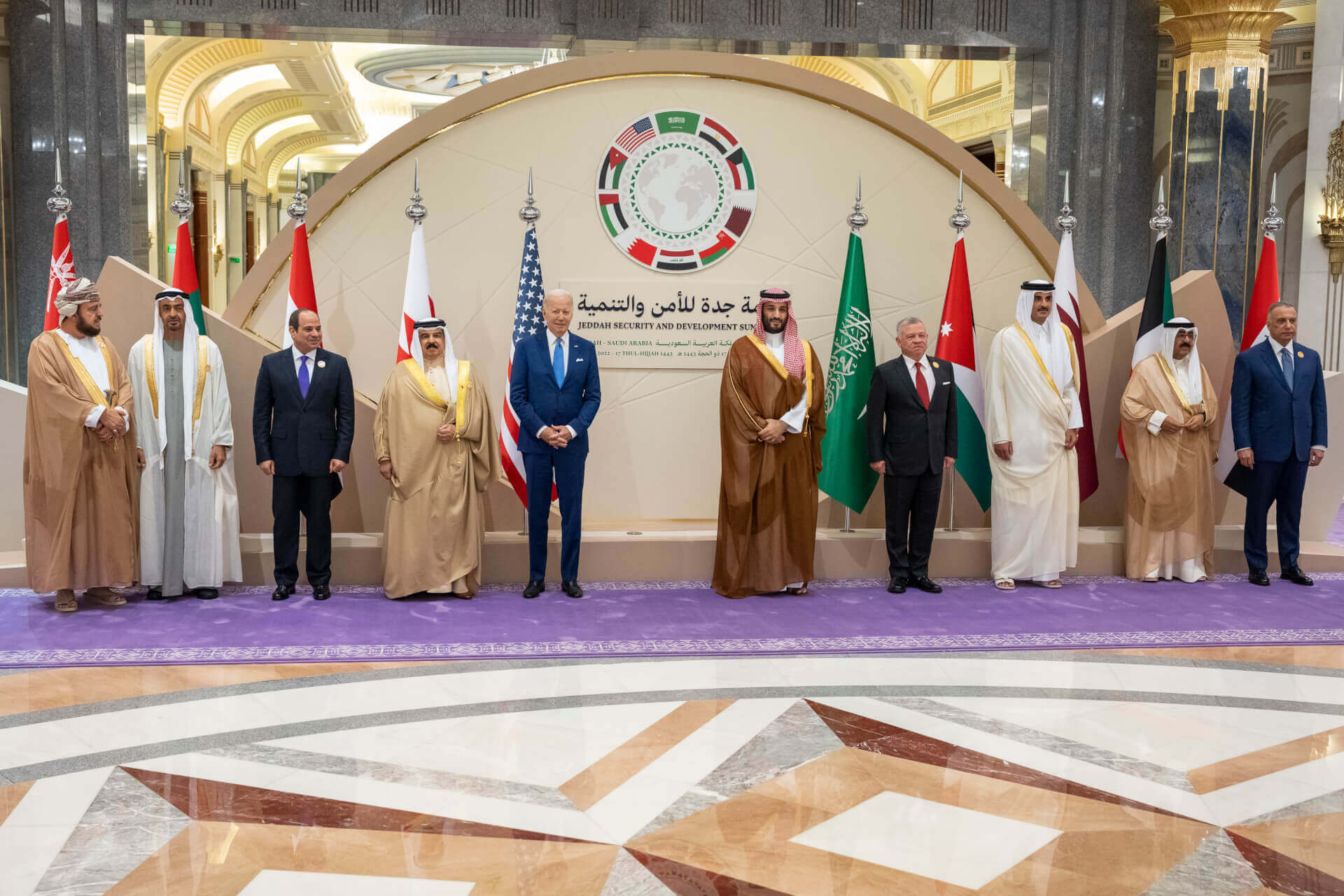United States (US) President Joe Biden vowed on Saturday at the ‘Jeddah Security and Development Summit’ that Washington will “remain an active, engaged partner in the Middle East. The summit was attended by leaders of the six Gulf Cooperation Council (GCC) members—Bahrain, Kuwait, Oman, Qatar, Saudi Arabia, and the United Arab Emirates—and the leaders of Egypt, Iraq, and Jordan.
“We will not walk away and leave a vacuum to be filled by China, Russia, or Iran,” Biden said, adding the US would continue to guard the region against threats through “principled leadership.” Blaming Beijing, Moscow, and Tehran for undermining the global rules-based order, Biden stressed that his administration will continue to protect the Middle East against threats by these actors.
It was good to attend a first-of-its-kind “Jeddah Security and Development Summit” with the leaders of the GCC, Egypt, Iraq, and Jordan. The U.S. is committed to a Middle East that is prosperous, peaceful, and integrated. We are invested in building a better future for all. pic.twitter.com/tZGqvturIf
— President Biden (@POTUS) July 17, 2022
“The US is clear-eyed about the challenges in the Middle East and about where we have the greatest capacity to help drive positive outcomes,” Biden emphasised, noting that the US’ interests are “interwoven” with the successes of the Middle East.
In this context, he announced a “new framework” for American engagement in the region and said that it is based on five principles.
First, he said the US will be renewing its focus on building partnerships with regional countries.
Second, Washington “will not allow foreign or regional powers to jeopardise freedom of navigation through the Middle East’s waterways.”
Third, the US will prioritise diplomacy to reduce tensions and end conflicts.
Fourth, the US will strive to integrate countries of the region by building “political, economic, and security connections” with US partners in the region.
Finally, Biden stressed the US “will always promote human rights and the value enshrined in the UN charter.”
A joint statement by the participants welcomed the US’ role in the region, saying, “The leaders reaffirmed the strategic importance of the historic ties between their countries” and vowed to “strengthen cooperation, coordination, and consultation in all fields.”
“The leaders affirmed their joint commitment to preserve regional security and stability, support diplomacy with the aim of regional de-escalation, deepen their region-wide defence, security, and intelligence cooperation, and ensure the freedom and security of waterways,” it added.
HRH Crown Prince: “The region's future requires adopting a vision that prioritizes achieving security, stability, and prosperity, focusing on mutual respect between its countries.” pic.twitter.com/Jh80l2Qeyd
— Foreign Ministry 🇸🇦 (@KSAmofaEN) July 16, 2022
Moreover, Arab leaders agreed to work with the US to ensure the Middle East is “free from all weapons of mass destruction” and underscored “the centrality of diplomatic efforts to prevent Iran from developing a nuclear weapon.” The leaders also agreed to “cooperate and coordinate” and “enhance their defence and joint deterrence capabilities against the increasing threat posed by the proliferation of unmanned aerial systems and cruise missiles, as well as against the arming of terrorist militias and armed groups,” referring to Iran’s arming of Yemen’s Houthi militias.
Regarding the rise in global energy prices, the leaders said the OPEC+ grouping, which includes Russia, is working towards “stabilising the global oil market in the interests of consumers, producers, and supporting economic growth.” However, no deal was reached between the US and GCC countries regarding ramping up oil production to bring down prices. Biden will have to wait until August 3 for OPEC+’s decision.
📷 | Part of the reception of HRH the Crown Prince to their Majesties, Excellencies, and Highnesses, the leaders and heads of delegations of the countries participating in the Jeddah Security and Development Summit at the King Abdullah International Conference Center. pic.twitter.com/gySIqIPlY2
— Foreign Ministry 🇸🇦 (@KSAmofaEN) July 16, 2022
Furthermore, the leaders agreed to work jointly to address terrorism concerns, ensure the stability of the global food supply chain, accelerate the transition to clean energy, and provide aid to countries facing acute humanitarian crises. Biden also held separate talks with the leaders of Egypt, the United Arab Emirates, Iraq, Jordan, Kuwait, Qatar, Bahrain, and Oman.

